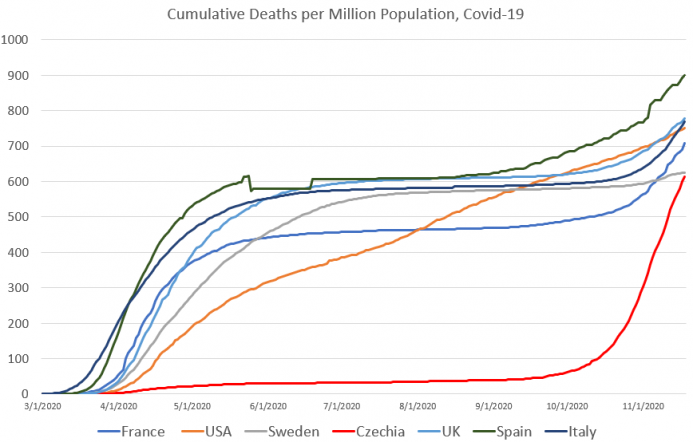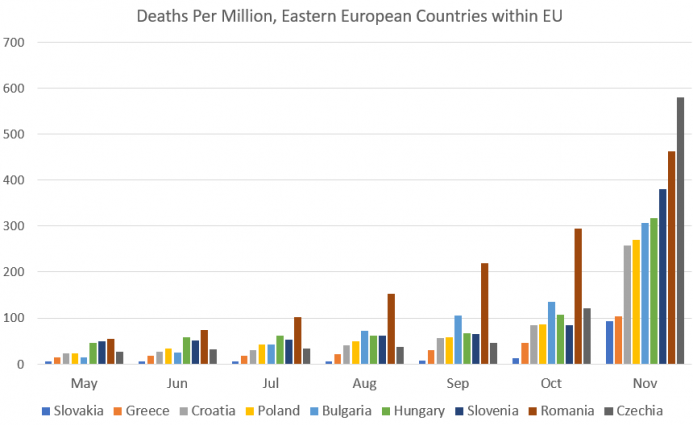
The science is getting clearer by the day: Lockdowns are meaningless! You can delay a pandemic, slightly, but you cannot suppress it. It's simply impossible.
Limited measures to protect the most vulnerable would have been enough. But how do you walk back from a political mistake? The answer is unfortunately that you do not. Western governments will double down on failed policies until the economy crumble or the people rebel, whichever comes first.
Here are the numbers:
Authored by Ryan McMaken via The Mises Institute,
Lockdowns are back on in Europe and are making a quick comeback in the US as well. Spain, the UK, Belgium, and France are back in full lockdown mode, although a multitude of restrictions on movement within each country remained in place even when full lockdowns were ended over the summer.
In France, for instance, one now “need[s] a certificate to move around,” yet in spite of long maintaining some of the continent’s most stringent lockdown and social distancing measures, total deaths per million are rapidly accelerating, to the point that France is likely to soon join other countries with harsh lockdowns in having among the worst rates of deaths per million in the world. Moreover, eastern Europe, which was once lauded for locking down strictly and early, is quickly finding that lockdowns aren’t likely to suppress total deaths there, either. The Czech Republic is seeing some of the worst growth in covid deaths worldwide, while the rest of the region is seeing similar growth, albeit to a less dramatic extent (so far).
Sources: Worldometer and Ourworldindata.org.
This is not what was sold to the public. Rather, politicians and their allies in the "public health" bureaucracies insisted that lockdowns would substantially reduce total deaths in countries that imposed them. Countries that failed to lock down would, on the other hand, experience runaway contagion with total Covid deaths per million orders of magnitude higher than those seen in countries that didn't lock down.
That's not what happened.
Cumulative deaths per million on the fifteenth of each month. Source: Worldometer.
Sweden, for instance, has long been denounced by politicians and media pundits for failing to embrace the methods of the French and the Spaniards. Many of these nations (i.e., Spain and the UK) have long had total Covid death per million well in excess of the Swedes. And now, other nations are surging (i.e., France and Czechia and the Netherlands) and will all likely soon be much higher than Swedish levels. (It might also be noted that Spain, the UK, France, Czechia, and Italy are now all seeing growth in Covid deaths at rates above that reported by the United States.)
Lockdowns Save Lives?
Of course, some supporters of lockdowns are likely to continue insisting that lockdowns clearly work to suppress total deaths because a handful of small countries near Sweden (i.e., Norway, Denmark, and Finland) have reported relatively few covid deaths. While this certainly may indicate there are factors at work in these countries that help keep covid mortality numbers lower, the fact remains that experience shows countries like Norway, Denmark, and Finland are outliers when compared to most of western Europe.
This isn’t exactly shocking. As early as July, studies were already beginning to show that lockdowns didn’t actually suppress total mortality. This one in The Lancet, for example, concludes,
government actions such as border closures, full lockdowns, and a high rate of COVID-19 testing were not associated with statistically significant reductions in the number of critical cases or overall mortality.
And in 2006, an extensive study in Biosecurity and Bioterrorism reported: "There are no historical observations or scientific studies that support the confinement by quarantine of groups of possibly infected people for extended periods" to slow the spread of influenza. No evidence has been offered for why this might be true of flu, but not true of Covid. Moreover, in a recent report from JPMorgan, Marko Kolanovic concluded that “re-opening did not change the course of the pandemic” and that “While we often hear that lockdowns are driven by scientific models, and that there is an exact relationship between the level of economic activity and the spread of [the] virus—this is not supported by the data.” Overall, evidence backing the lockdown theory has simply failed to materialize.
Where's the Evidence?
Indeed, as Swedish authorities have long claimed, the experience points toward an outcome in which most countries will end up with similar total deaths per million regardless of lockdown policy.1 This looks more likely by the day. As noted by Dr. Gilbert Berdine here at mises.org, “The data suggest that lockdowns have not prevented any deaths from covid-19. At best, lockdowns have deferred death for a short time, but they cannot possibly be continued for the long term.” This, of course, is why even the WHO does not recommend lockdowns except as a very short term and ad hoc measure. The side effects of the lockdowns themselves are too dangerous.
We already know that isolation, unemployment, and other social ills caused by lockdowns affect both physical and mental health. But we also know that lockdowns lead to deaths from untreated medical conditions. Moreover, government health experts in many cases have callously cut off the elderly from all their social and family support. The Associated Press estimates that for “every two COVID-19 victims in long-term care, there is another who died prematurely of other causes.” Many of these deaths are brought on by neglect and isolation caused by state-mandated lockdown policies.
Examining Excess Mortality
But where would we find evidence of these deaths in the aggregate? Unfortunately, regimes spend very little time counting them. Rather, regimes often only record events in ways that help the regime. While they are careful to count as many covid cases and deaths as possible in big bright numbers reported daily by government officials, deaths caused by lockdowns are generally ignored.
Eventually, the only way to guess the impact of these other deaths will be through the “excess mortality” data. Excess mortality—using a definition now generally used in the media and by government officials—occurs when total mortality during a time period exceeds the average mortality experienced over the past five years.
Some initial reports have suggested that covid deaths comprise only around 70 percent of excess deaths (see here and here). Naturally, lockdown advocates claim that this shows covid deaths are being undercounted, and that covid deaths should be assumed to account for virtually all excess deaths. This is only conjecture.
In any case, we find, not surprisingly, that excess mortality in Sweden has been lower this year compared to many other western European countries with harsh lockdowns. For example, through October the average number of deaths for 2015–19 in Sweden was 72,972. In 2020, the total deaths for the same period was 76,375. That’s an increase of 4.6 percent.
Likewise, in France, 2020’s total excess mortality is up 6.4 percent. It’s up 12.7 percent in England and Wales, up 16 percent in Italy, and up 17 percent in Spain.
How much of this excess mortality in lockdown countries is attributable to the lockdowns themselves? For now that’s still unknown. But, as Dr. Berdine writes:
It seems likely that one will not have to even compare economic deprivation with loss of life, as the final death toll following authoritarian lockdowns will most likely exceed the deaths from letting people choose how to manage their own risk. After taking the unprecedented economic depression into account, history will likely judge these lockdowns to be the greatest policy error of this generation.



No comments:
Post a Comment